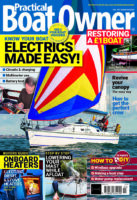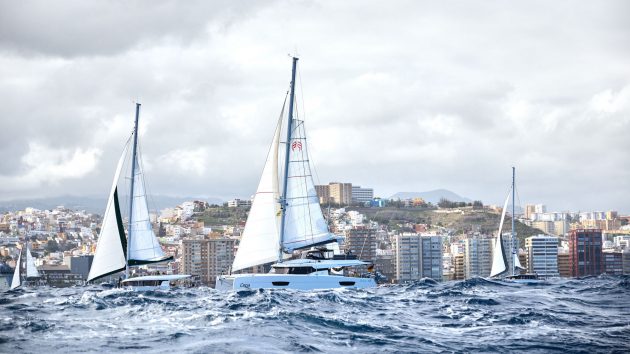A north easterly swell meant a rolly and uncomfortable start for the 138 yachts taking part in this year's Atlantic Rally for Cruisers.
The fleet departed Las Palmas, Gran Canaria yesterday for Saint Lucia on the 37th edition of the ARC, with over 800 crew taking part, in monohulls, multihulls and one motorboat.
The long-range forecast promises good tradewinds for the 2,700-mile voyage. However, strong gusting winds built up a 1.5m swell, causing some discomfort for boats on the start line. The wind was more easterly than is typical for an ARC start, meaning it was a white sail reaching start in the 18-20 knot winds, continuing at around 20 knots today, with higher gusts in the acceleration zone to the south of Gran Canaria.
The choppy start was in stark contrast to the ARC+, the sister event to the Atlantic Rally for Cruisers, which departed on 06 November, and is now on its second leg from Cape Verde to Grenada.
Where is the ARC acceleration zone?
The acceleration zone extends 100NM down from Gran Canaria, where strong winds are funnelled by the 2,000m-high mountains. Skippers will need to take precautions, reefing early and navigating a more southerly route away from the strongest winds during the first 24 hours.
After this, the fleet should move into more settled trade winds, especially to the south of the rhumb line, a pattern expected to hold for at least the first week of the crossing.
Preparations for the ARC

Bernie and Julie onboard Circe. Photo WCC/ James Mitchell
Bluewater boats

The hard top on this Hallberg-Rassy Circe makes life much more comfortable
“It’s amazing the difference it makes when you’re in bad weather,” he said. “You can hear the wind howling everywhere on deck, but if you come and sit in the cockpit under here, it quiets it all down. It’s truly amazing.”
Fun on Navasana
Chet Chauhan has owned monohulls all his life, but together with wife Jessy, decided on a Nautitech 46 Open catamaran for the ARC. He wanted a catamaran for tropical cruising, but ruled out some of the other designs.

Chet (left) says Navasana is the ideal boat for tropical cruising. Photo WCC/ James Mitchell
“I don’t like sitting on a pedestal, I want a boat where you feel you’re sailing, and you feel the pressure on the rudder and the steering wheel, so we bought Navisana,” he said. “Saying that, though, if we go back to England, I’ll buy a monohull – they’re more fun to sail, but this is a moving house.”
Chet reported a boat speed of 17 knots this morning as he surfed down a wave. In his blog, Sailing Navasana, he explained he’d normally pick a good weather window to start a long passage, but hit top winds of 42 knots in the acceleration zone.
“Waves were huge as well, knocking the boat quite badly at times, with our trusty autopilot complaining that the rudder was hard over,” he said. “We crossed the acceleration zone and ended up in a wind hole at 2am with less than 10 knots, which took a while to sail out off. Anyway glad that is done!”
Meanwhile Jessy encountered a ‘minor emergency’ when a huge wave slammed the bathroom door shut and locked her in, requiring Chet’s technical skills to free her!
You can find out more about Chet’s modifications for bluewater cruising in the March issue of Practical Boat Owner, on-sale 19 January.
First over the line
There was an emotional farewell as Las Palmas Marina gradually emptied, leaving bare pontoons for another year.
With the committee vessel, the Armada española (Spanish Navy) ship Meteoro on station, the first start was for the Multihull and Open Divisions.
Despite carrying a reef or two, the performance catamarans streamed over the start making 5-6kts, led by all-electric ITA Catamaran 14.99 Nanomole (MLT) skippered by Ulrik Bjerl Nielsen from Denmark.
Up next, a smaller than usual ARC racing fleet battled the swell on the inshore line and it was a safe and steady start with many days of ocean sailing ahead.
Harmony 52 Sao Jorge (GBR) was first across the line, followed by Beneteau First 53 Firstlady (DEU), and the smaller Beneteau 40.7 Escapado (GBR) following in third.
Sao Jorge and Escapado are both charter boats from the British based Sail Racing Academy, carrying guest crews with a professional skipper and mate onboard.
Meanwhile, in the Cruising Division, Anthony Auger’s Oyster 665 Patience of London (GBR) was at the front of the fleet.
Youngest and oldest crew
A classic trade wind sail is forecast as the boats head south before they turn to point theirs bows to IGY Rodney Bay Marina. From the youngest crew, aged just two years old, to the oldest skipper at over 80, the ARC sailors coming from 35 different nations will soon adapt to life on the ocean waves after a rush of pre-departure preparations.
All ARC boats are fitted with YB Tracking satellite trackers, allowing family and friends to follow the fleet from the comfort of home via the ARC website or YB Races App.
ARC+ fleet bound for Grenada
The departure of the ARC fleet sailing directly to Saint Lucia today means a combined total of 234 yachts are crossing the Atlantic under the ARC banner in November 2022.
The ARC+ fleet of 91 yachts departed Mindelo, Cape Verde for their second leg of their crossing last Friday, bound for Camper and Nicholson’s Port Louis Marina in Grenada.
A further 43 yachts will join the second edition of ARC January, setting sail in the new year, in a third Atlantic crossing rally organised by World Cruising Club, sailing from Gran Canaria to Saint Lucia.




